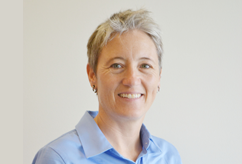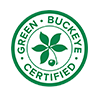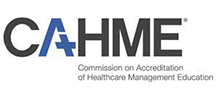October 11, 2016 by Katie Raby
 Program for Experienced Professionals (PEP) student, Julia Applegate, is the health program director at the Equitas Health Institute for LGBTQ Health Equity. With over 20 years of experience in curriculum design, education and public health programming, Applegate and her team work to develop and deliver LGBTQ healthcare education and training, engage with LGBTQ patients, collaborate with many community-based organizations and support health research efforts in the Midwest for the LGBTQ community.
Program for Experienced Professionals (PEP) student, Julia Applegate, is the health program director at the Equitas Health Institute for LGBTQ Health Equity. With over 20 years of experience in curriculum design, education and public health programming, Applegate and her team work to develop and deliver LGBTQ healthcare education and training, engage with LGBTQ patients, collaborate with many community-based organizations and support health research efforts in the Midwest for the LGBTQ community.
A 2015 Kaiser Family Foundation report found the LGBT individuals are at higher risk for suicide, sexually transmitted diseases, substance abuse and mental health disorder than heterosexual individuals. Many LGBTQ individuals have reported that they have received negative and disrespectful treatment by healthcare providers that are blaming their illness on their sexual orientation or not being aware of LGBT health needs and tending to their health issues correctly. Applegate works to provide LGBTQ individuals with excellent health care treatments with providers that are competent to care for them
Why do you feel the work you do is important?
I feel that the work I do is important because I work directly with LGBTQ community members and with health and social service providers who are responsible for providing care to this population. I believe by educating providers in the provision of culturally competent care, LGBTQ individuals will experience better health outcomes and we will move toward health equity for this population
What do you find most fulfilling about your role?
Educating a wide variety of people who work with LGBTQ individuals is extremely fulfilling. Over the past three years I have trained over two thousand practitioners ranging from psychiatrists, patient care assistants, social workers, physicians, receptionists, prison guards, school nurses, ministers, high school educators and more.
What inspired you to become a PEP student?
I had a lot of practical public health experience, but lacked the academic and theoretical knowledge of the discipline. I was introduced to the Principles of the Ethical Practice of Public Health in a professional setting and realized that I needed more textbook knowledge about my field of practice. I was also advancing in my career to the point where I believed having the credentials of my field made a difference.
“While it is difficult to manage a full time job and graduate school, I really believe it is a worthwhile endeavor. I have enjoyed my classes, the relationships I have made with my professors and my classmates and the opportunities that have presented themselves through being connected with the College of Public Health.”
How has your public health education impacted your current role and what you see yourself doing in the future?
I have learned so much in my first year of the program. I have been able to make connections between theory and practice that I was not able to do before. I have also gained experience through my practicum at Nationwide Children’s Hospital that directly influences the work I do at Equitas. In my ideal future I would work both locally and globally. I would love to do global LGBTQ health for the World Health Organization or the United States Agency for International Development.




